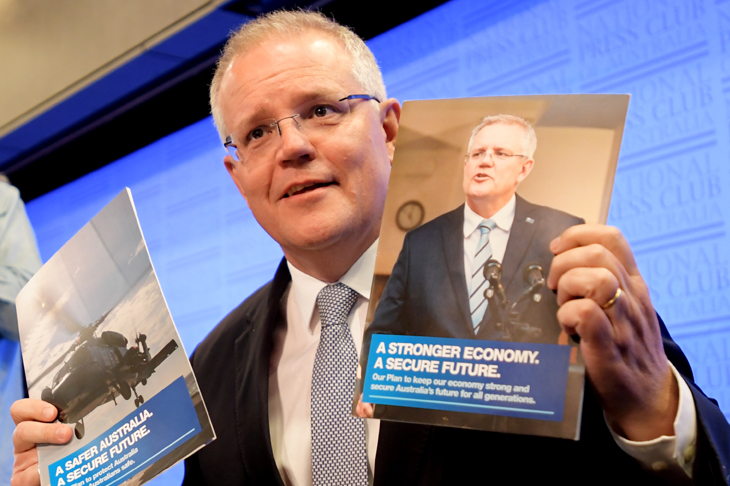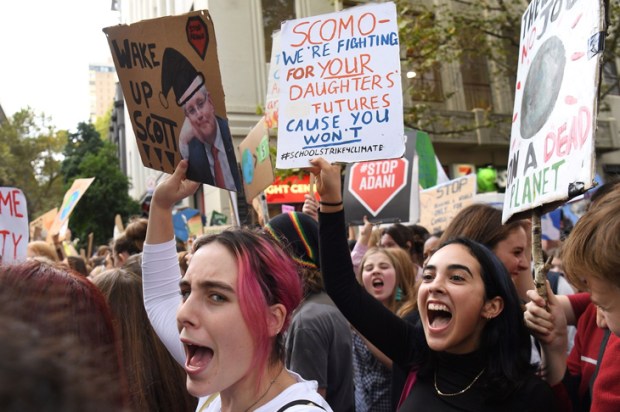Well, the election is almost here. In a little over a week we’ll know if Scott Morrison has pulled off an improbable comeback win or whether Electricity Bill has scraped home. Let’s consider both those scenarios, but in reverse order.
Start then with the prospect of a Labor win, or a Labor-Green cooperative venture. Should one wake up to that how many of you will wish that Shorten had snuck in last time? You remember, back when Malcolm ran the world’s worst campaign. Compare Shorten ’16 to today’s model and the former looks lower taxing; he looks a bit more sane; his party was a tad more to the right than today’s incarnation. In that 2016 election I put Labor above the Libs on my ballot – so Greens last, the Coalition second last, Labor third last and then more or less randomly filled in the rest. My thinking – the so-called ‘Del-Con’ strategy – was that with Malcolm and the Black Hand gang in charge and dragging the Liberal party ever further to the left, we should bite the bullet and get the Shorten win out of the way. Better still, such a scenario would see Turnbull purged and the blame for the Libs’ disaster placed firmly on those MPs in the party’s ‘moderate wing’ (read, the left-most part of the party’s spectrum and in some ways miles to the left of the Howard government).
Was that an easy or particularly palatable choice? No. But it was premised on a belief that the consequences of a Shorten 2016 win would be a helluva lot better than one in 2019, all things considered, and that with the moderates running the Liberal party victory for them in 2019 was pretty unlikely. That was my thinking and should Shorten prevail next week it will, I think, make my thinking back then look pretty good.
However, given how truly awful today’s Labor Shorten incarnation is I really, really hope I was wrong and that Morrison can sneak over the line. It’s unlikely, but possible. Yes, I don’t think we can deny that Team Morrison and before that Team Turnbull have been pretty awful – weak Cabinet ministers on the whole, no core guts on pulling out of Paris or ditching the NBN, the first movers on attacking the superannuation incentives and worsening the savings’ position of some of their core voters, no commitment to free speech, completely useless on the universities with their monolithic left-wing worldviews, overseeing the shift to the democratic world’s highest energy prices, do-nothings on our dysfunctional federalism (which in some ways is the core cause of Australia’s downward trajectory), comparatively big spending (think about insouciantly throwing hundreds of millions at some Barrier Reef outfit over lunch or giving the ABC tens of millions just before the election for Lord knows what) and high taxing, and the list goes on from there. So it’s not a track record to be unduly proud of. Yet it’s now patently clear that Shorten and Labor will be worse, a lot worse. And of course the Libs did finally, though possibly too late, get rid of the cuckoo in the nest by the name of Malcolm.
So all in all it seems to me that my days of voting for Labor, as in preferencing them above the Libs, are over. It was one and done. I still think this current incarnation of a supposedly right-of-centre party is a pretty insipid and unattractive outfit. But my cost-benefit calculation this time has me back with the Libs. Will I put them as my first preference? No. And I suggest you don’t either as public money follows one’s first preference vote and they don’t deserve any. No, I’ll be putting the Greens dead last, as usual, then Labor second last, the Libs third last, with all the others scattered above that. In effect, then, I’ll be back to voting for the Coalition.
Why? Well, it’s not just the immense satisfaction that will come from seeing Malcolm Turnbull’s desire for a Liberal party loss frustrated – and does anyone doubt he’s secretly hoping the party that ditched him will lose? That will be a small part of it, but it’s really just looking at Labor and thinking ‘these guys are now beyond the pale’. Had Shorten pulled a Keating or Hawke and kept Team Labor more towards the centre he would have romped home. Instead it’s become a very high-spending, big-taxing vehicle that’s even more renewables-obsessed than the Libs. Australia would be better off with Morrison and so I’ll be voting accordingly.
Of course, if Morrison does slip back in then those who opted back in 2016 to hold their noses and vote for Turnbull, hoping he’d be defenestrated and someone with at least a few conservative views put in his place will have been proved right.
Well, they’ll have been right at least in the sense that a Liberals win in 2016 would not lead to a Labor win in 2019, as I reckoned back at the time. We will still have the problem of a Coalition that has a preponderance of MPs a good deal to the left of their core voters.
And that takes me to an observation about Australia’s voting system. You see I’ve changed my mind on preferential voting (which really only exists in Australia and one, I think, South Pacific jurisdiction). When I first got to Australia I liked it because under it voters get to indicate who they dislike as well as like. And I still think it’s miles better than proportional voting systems such as those in Europe or across the Tasman.
But it’s now clear that preferential voting makes it much harder than the first-past-the-post voting systems you see in Canada, the US and Britain to discipline the main parties. Ultimately, at some point on your ballot in this country, you have to pick between the two main parties. You either put Labor above the Libs or vice versa and that overwhelmingly equates to a vote for the one higher up the ballot. And the two main parties know it. That’s not true in, say, the UK as Theresa May’s Tories just saw in their local government elections and if they don’t ditch her soon will massively discover at the next election. Here, you are structurally prevented from wholly turning your back on the big party on your side of the political divide. That makes it near impossible for new start-up parties to compete. (Compare the new Brexit Party in Britain that didn’t exist earlier this year and now leads in the polls.)
Still, it is what it is (at least until it isn’t). My fingers are crossed that I was too pessimistic back in 2016. We’ll see.
Got something to add? Join the discussion and comment below.
Get 10 issues for just $10
Subscribe to The Spectator Australia today for the next 10 magazine issues, plus full online access, for just $10.
You might disagree with half of it, but you’ll enjoy reading all of it. Try your first month for free, then just $2 a week for the remainder of your first year.














Comments
Don't miss out
Join the conversation with other Spectator Australia readers. Subscribe to leave a comment.
SUBSCRIBEAlready a subscriber? Log in